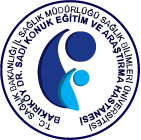ABSTRACT
Objective:
It is aimed to identify the burnout levels of health personnel working in Nene Hatun Maternity Hospital, searching their relation with socio-demographic variables and discussing what can be done in company with the literature by examining the causes of burnout.
Material and Methods:
Health personnel working in the hospital have been applied a questionnaire on a volunteer basis by using socio-demographic information form, Maslach Burnout Inventory and Minnesota Job Satisfaction Scale. The data has been analyzed with SPSS 20 statistics program.
Results:
The subscale ratios of MBI-emotional burnout of health personnel participating in the study have been found as the following according to occupational groups: 31.1±5.2 in gynecologist, 30.8±8.3 in other doctors group, 30.2±6.7 in allied health personnel and all of them are in highly affective burnout group. The scores of job satisfaction have been calculated as 54.8±10.2, 52.6±11.1, 55.1±12.7 respectively and it means medium range job satisfaction. It has been detected that there is a meaningful relation between the burnout subscales of the work time, guarding, believing that the job gets what it deserves in the society, believing that the job is correctly chosen, job’s meeting the expectations, getting in-service training over the past year, participating in occupational academic studies, following the medical publications, smoking and/or the scores of job satisfaction.
Conclusion:
Our findings have supported that in hospital scale doctors and allied health personnel have burnout at high degrees and the mediumrange satisfaction of health personnel revealed that it is necessary to take precautions to this issue. The burnout rate of health personnel has effects on service areas, decreases the productivity and increases the probability of error. The results of the burnout affecting physical, emotional and work life should be known, the personnel should be supported by administration scientifically and socially, work load should be balanced and burnout should be intervened by raising awareness in order to hinder individual and organizational harms.



